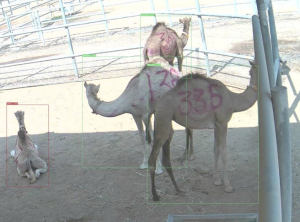
Applying artificial intelligence and machine learning to assess the health status of camels in farm conditions
Camels play vital roles in the Arabian Gulf region and hold significant economic importance within the food and biosecurity sectors. They provide essential resources such as milk and meat, and serve purposes in transport, entertainment, and as foundational elements in the social fabric of pastoral societies. Camels are naturally active creatures, capable of covering distances of 20-25 km daily as they seek out food, water, and shelter in the harsh desert environment. They exhibit remarkable resistance to pathogens, can survive for up to a month without food, several days without water, and experience fluctuations in body temperature ranging from 36-39 °C throughout the day.
With the impacts of global warming leading to reduced water sources and natural vegetation, coupled with an increase in camel populations, numerous camel farms have emerged. However, confining camels in restricted housing environments can cause stress, affecting their behavior, performance, and various physiological systems, including their immune system. Recent studies have shown significant changes in the immune profiles of dromedary camels kept in confined conditions compared to those roaming freely.
Camel reproductive efficiency is also affected, with calving intervals exceeding 3 years and a calf mortality rate of 27% reported under farm conditions. Compounded by the remote locations of many camel farms, access to veterinary services can be delayed, impacting timely interventions for camel health issues and management.
Artificial Intelligence and Advanced deep-learning technologies are proving invaluable in animal research, particularly for continuous monitoring of camel health and welfare. Analyzing movement patterns over time can provide insights into their well-being, potentially enabling early detection of health issues through automatic recognition of abnormal daily activities and any abnormal behavior or appearance.
At the Fujairah Research Centre, machine learning techniques have been employed to automate the identification and analysis of camel behaviors, including calving activities, diagnosis of skin infections like ringworm, and prediction of calving time and behavior. Machine learning algorithms trained to differentiate healthy, stressed, and unhealthy camels have shown promising accuracy in diagnosing camel ailments.
In conclusion, artificial intelligence and machine learning methods are revolutionizing camel health management, offering efficient means to monitor, diagnose, and address health concerns in these valuable animals.
